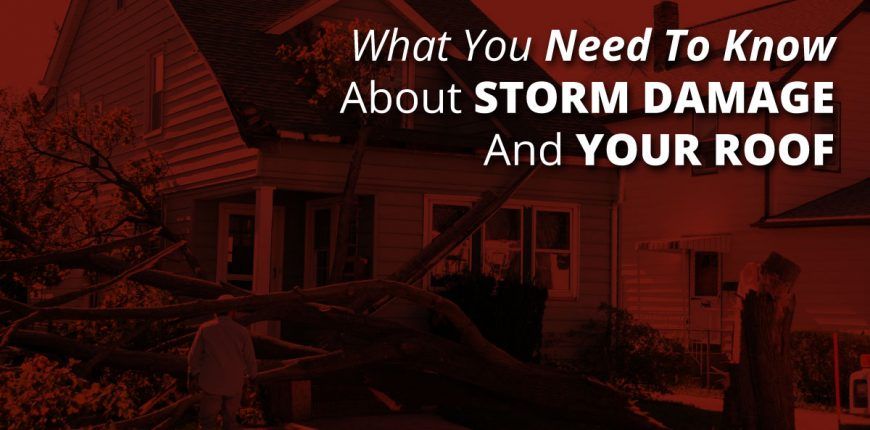
You can count on a lot of things in New Hampshire, including natural beauty and unpredictable weather. The latter may bring everything from high winds and hail to snow and ice, and wreak havoc on a home’s roof. In turn, the damage can require repair work and even a full roof replacement. Let’s look at the types of storms you may experience in New Hampshire and the damage they can inflict.
Hail Damage
Hail can cause extensive damage, and the kind of damage varies depending upon the roofing material. Hail damage on a roof with asphalt or composite shingles, for example, can cause a loss of shingle granules and expose the roofing felt underneath.
Fortunately, most homeowner’s insurance policies cover hail damage, which is one of the most common homeowner’s claims.
Wind Damage
High winds can damage roofs whether they’re accompanied by other harmful weather such as hail or not. Damage may include leaks, missing shingles, and more.
Most homeowners’ insurance policies cover wind damage, including tree-related damage caused by high winds.
Rain/Hurricane Damage
Heavy rain can cause many types of damage to your home’s roof, including leaks, stains, rot, mold, cracks, and lead to the formation of destructive ice dams. Hurricanes, meanwhile, may cause much more extensive damage and ultimately require a full roof replacement.
Most standard homeowner’s policies cover rain damage (unless leaks are the result of negligence, such as a lack of regular maintenance). Policies usually cover damage caused by Mother Nature, such as hurricanes and tornadoes.
Snow Damage
While snow on a roof provides some insulation from frigid temperatures, too much of it can cause structural damage and lead to ice dams and leaks. Many insurance policies cover roof damage caused by severe winter storms, such as blizzards.
Ice Damage
Ice dams form from melting snow and if left unchecked can lead to leaks that damage the interior of your home. Again, most insurance policies cover damage caused by heavy winter storms – which can lead to ice dams – but several variables, including the condition of your roof, affect the claim.
Tornado Damage
It’s no secret that tornadoes can cause significant destruction. A tornado can have a vacuum effect that sucks roofing material off of the house as flying debris also causes damage.
While homeowner’s policies typically cover roof damage caused by high winds, it may depend on where you live, the type and amount of coverage, and the cause of damage.
Thunder/Lightning Damage
Thunder and lightning can blast shingles off your roof and may lead to a fire if it ignites the wooden beams underneath. The good news is that most policies cover lightning strikes and the ensuing damage.
Insurance and Storm Damage
One of the first things you should do when storm damage occurs is to call your insurance company. Your homeowner’s insurance policy should provide coverage for many types of damage, but your insurance agent will go over the policy with you and its specifics.
The following are some tips for filing a claim:
- Have your insurance policy with you when you call your agent or insurance company.
- Have a list of details with you that includes what type of storm caused the damage and the time it occurred.
- Discuss the procedures and deadlines for filing a claim.
- Go over all of the details about what repairs – or possible roof replacement – your policy covers.
- Set up an appointment with the insurance adjuster as soon as possible. Your adjuster will inspect the damage and cost of repairs. Always make sure that your roofing contractor is there at the same time to ensure an accurate claim gets filed.
- Talk to your agent about the claims payment process, including how it will get paid.
The importance of working with a local roofer
Choosing a qualified, dependable roofer is of the utmost importance when storms damage your roof. The roofer should not only be able to handle the necessary repairs – or roof replacement, if necessary – but understand the insurance claim process completely.
Perhaps most importantly, you should choose a local roofer when storm damage occurs. Areas where storms frequently occur are often inundated with “storm chasers” who target homeowners but don’t stick around to support their work after it’s finished.
There are other reasons for hiring locally:
- Local contractors understand and comply with local building codes and requirements.
- It’s easier to choose among contractors near where you live. You can set up face-to-face meetings and get references from other customers who live in the area.
- It’s also easier to develop a long-term relationship with a roofer who’s from the same area. A relationship with a local roofer lasts well after the repair work is done.
You need an experienced, reliable roofer when a storm damages the roof of your New Hampshire home. J. Carnes & Son Roofing has the experience and knowledge you need.




